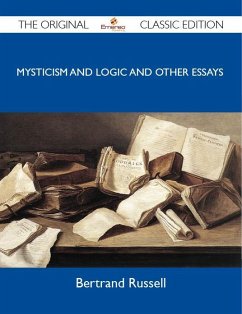
Mysticism and Logic and Other Essays - The Original Classic Edition (eBook, ePUB)

PAYBACK Punkte
2 °P sammeln!
A contradictory sort of fellow - Will Durant, in his congenial The Story of Philosophy, describes Bertrand Russell as ...resolved to be hard-headed because he knows he can not be. This is a bit unfair, as it doesnt really take into account Russells philosophy, merely the man. But the two are so hard to separate! Basically, Russell believes that mysticism is the inspirer of what is best in man. But that it is absolutely muddle-headed and has lead mankind down numerous philosophic blind alleys in the past thousand or so years. He was a mathematical genius, wrote prose that could cut like a razor...
A contradictory sort of fellow - Will Durant, in his congenial The Story of Philosophy, describes Bertrand Russell as ...resolved to be hard-headed because he knows he can not be.
This is a bit unfair, as it doesnt really take into account Russells philosophy, merely the man. But the two are so hard to separate! Basically, Russell believes that mysticism is the inspirer of what is best in man. But that it is absolutely muddle-headed and has lead mankind down numerous philosophic blind alleys in the past thousand or so years.
He was a mathematical genius, wrote prose that could cut like a razor blade concerning the most abstruse subjects in a manner understandable to most laymen, and was a profound skeptic in re matters religious. This latter got him into all kinds of trouble with womens societies and the like back in the earlier part of the century and actually got him fired from the City College of New York. So he packed his bags and went to teach at Harvard.
You see, he was a British aristocrat (an Earl) and all this rabble rousing by the hoi polloi was really a non-issue for him. In his autobiography, he recounts how his mother always told him, Never follow a crowd to do Evil. Russell never followed a crowd to do anything!
All this biographical elaboration is to help readers understand the man who wrote this book which, in a nutshell, praises the mystical impulse in its pure, unadulterated form while deploring the aforementioned philosophical muddles to which it leads, and, on the other hand, glorifies (justly) the English schools of empirical logic and the scientific progress to which they have lead. One can hardly look at this computer screen and deny this claim.
All this in a lucid and thoroughly enjoyable prose. Yes, Russell has seen his days of celebrity come and go (as well as his days in general, one might add,) but if you chance by a wizened looking professor loaded down with heavyweight tomes on metaphysical systems, you might get a rather surprising response if you mention Bertie Russell.
In his day, Russell was the Mick Jagger of Philosophy, and coeds used to quarrel over who got to bed down with him that night when he came to lecture that the stuff a good proportion of their professors were teaching was, quite literally, nonsense.
And just think, he got away with it all! What fun!
This is a bit unfair, as it doesnt really take into account Russells philosophy, merely the man. But the two are so hard to separate! Basically, Russell believes that mysticism is the inspirer of what is best in man. But that it is absolutely muddle-headed and has lead mankind down numerous philosophic blind alleys in the past thousand or so years.
He was a mathematical genius, wrote prose that could cut like a razor blade concerning the most abstruse subjects in a manner understandable to most laymen, and was a profound skeptic in re matters religious. This latter got him into all kinds of trouble with womens societies and the like back in the earlier part of the century and actually got him fired from the City College of New York. So he packed his bags and went to teach at Harvard.
You see, he was a British aristocrat (an Earl) and all this rabble rousing by the hoi polloi was really a non-issue for him. In his autobiography, he recounts how his mother always told him, Never follow a crowd to do Evil. Russell never followed a crowd to do anything!
All this biographical elaboration is to help readers understand the man who wrote this book which, in a nutshell, praises the mystical impulse in its pure, unadulterated form while deploring the aforementioned philosophical muddles to which it leads, and, on the other hand, glorifies (justly) the English schools of empirical logic and the scientific progress to which they have lead. One can hardly look at this computer screen and deny this claim.
All this in a lucid and thoroughly enjoyable prose. Yes, Russell has seen his days of celebrity come and go (as well as his days in general, one might add,) but if you chance by a wizened looking professor loaded down with heavyweight tomes on metaphysical systems, you might get a rather surprising response if you mention Bertie Russell.
In his day, Russell was the Mick Jagger of Philosophy, and coeds used to quarrel over who got to bed down with him that night when he came to lecture that the stuff a good proportion of their professors were teaching was, quite literally, nonsense.
And just think, he got away with it all! What fun!
Dieser Download kann aus rechtlichen Gründen nur mit Rechnungsadresse in A, D ausgeliefert werden.



